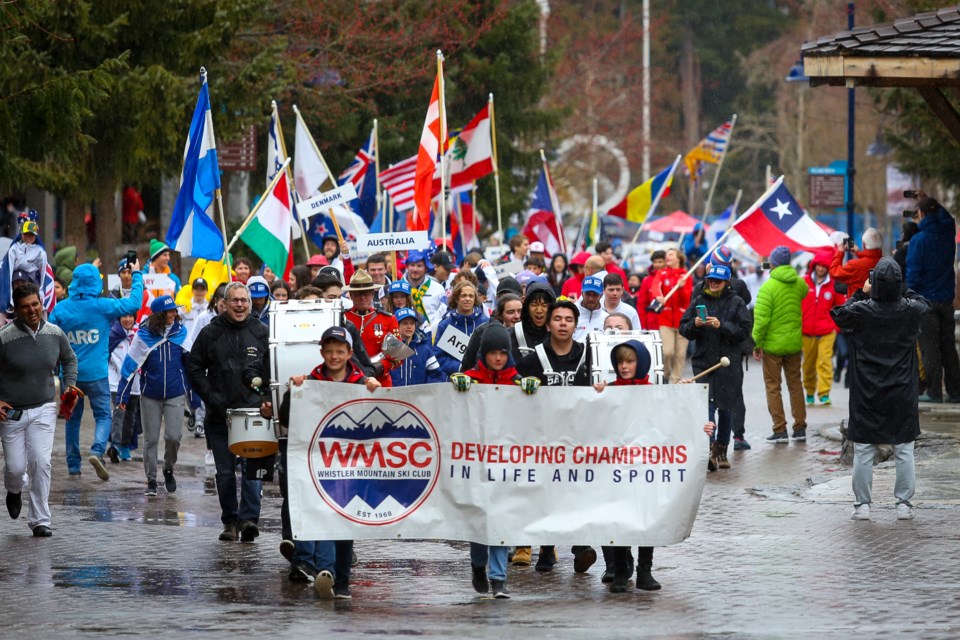Thirty years after its inauguration and three years after the COVID-19 pandemic shut down operations, the Whistler Cup will finally return to local slopes next week.
Over 450 athletes from 18 countries are on their way to participate in North America’s biggest youth ski race. The event will officially launch with an opening ceremony on April 13 and run until April 16.
In 1993, the Whistler Cup was created by former Whistler Mountain Ski Club (WMSC) program director Joze Sparovec along with Max Meier and Jim Yeates. Since then, the race has welcomed many a skiing heavyweight, including American record-breakers Mikaela Shiffrin and Lindsey Vonn, European standouts such as Marcel Hirscher and Matthias Mayer, and local legends such as 2010 Olympic ski cross queen Ashleigh McIvor.
Excitement is in the air as a new crop of skiers are ready to continue the tradition.
“[This competition] has the unique flavour of bringing kids from across Canada, but also from overseas,” said event manager Christine Cogger. “A lot of these skiers won’t necessarily have an opportunity for this kind of international exposure again, so that’s really what we want to lean into—giving these kids [an opportunity] to ski against some of their counterparts from Finland, Norway and Ontario. It’s really a special feeling.”
The full list of participating nations includes Argentina, Australia, Belgium, Brazil, Chile, the Czech Republic, Finland, Germany, Great Britain, Italy, Japan, Korea, New Zealand, Norway, Switzerland, Thailand and the United States.
In Cogger’s view, such a robust showing reflects Whistler’s continuing appeal to talent from around the globe, including from non-traditional ski countries like Thailand. Part of what makes the Whistler Cup special is the chance it affords U16 and U14 athletes to bond with their overseas peers at nightly dinners, as well as the opening and closing ceremonies.
Of course, none of it would be possible without the staunch commitment of hundreds of volunteers from the Sea to Sky and abroad. Friends and family members of visiting athletes often step up, joining loyal locals in staffing every aspect of the Whistler Cup: from accreditation to meal prep to race operations.
Cogger estimates that the contest is 99-per-cent volunteer-run. “Ski racing is a niche that has a really great ability to draw volunteers in, and they are not just one-time [helpers],” she said. “We have some people who’ve been doing this for years, and it’s just a real passion for them. It’s really nice to see that they’ve created their own family of volunteers, and they really support all of our events at the [WMSC].”
Whistler Blackcomb has also been a reliable partner that ably and perennially accommodates major competitions, from opening early on consecutive days to partitioning off Raven, Ptarmigan and Upper Dave Murray—the areas where races generally take place. Many athletes will either arrive early or stay after the Whistler Cup concludes to experience one of North America’s largest ski resorts as guests.
Although this year’s edition of the Whistler Cup won’t be drastically different from before, Cogger and her team hope to bottle the world-class energy from past iterations—beginning with an athlete’s parade scheduled for next Thursday at 4:45 p.m. The procession is to begin at Whistler Olympic Plaza and wind through the village in honour of the athletes and their supporters before the opening ceremony.
“We’re really going to lean into the theme of heroes, because to put on an event for 30 years takes a lot of heroes,” said Cogger. “It’s not just the great skiers we meet. We have heroes in the form of volunteers and sponsors who help us bring this event to life.”
The COVID hiatus has unfortunately deprived a generation of their chance to partake in the Whistler Cup, which does not involve athletes over the age of 16. It’s no small loss, as the contest is a banner experience for many—especially those who don’t go on to race on a senior international circuit. Moreover, competing overseas can be formative for teens used to smaller events much closer to home.
Thankfully, a new beginning is around the corner.
“We really hope that the community will come out and support us,” Cogger said. “I hope they line the parade route to cheer on the athletes and come up on the hill to watch some really great ski racing.”
More information is available at whistlercup.com.




